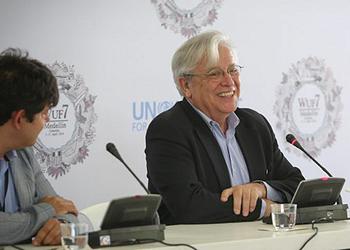
MEDELLIN, Colombia, April 10, 2014 (ENS) – Achieving sustainable transport and mobility globally is one of the three critical areas of focus for the new Greener Cities Partnership launched Tuesday at the World Urban Forum in Medellin.
The United Nations Environment Programme (UNEP) and the United Nations Human Settlements Programme (UN-Habitat) have joined forces to mainstream the environmental perspective into urban policy making, while at the same time incorporating urban perspectives into environmental policies.

Africa will be the partners’ first area of activity. They will work to establish a forum for promoting sustainable transport and support the development of an action plan for sustainable transport across the African continent, and particularly in Kenya, where both UN agencies have their headquarters in the capital, Nairobi.
Today’s cities accommodate about 50 percent of the world’s population, a number that is projected to grow to 70 percent by 2050.
With half the world’s population living in urban areas, the importance of creating greener, more resilient cities and facilitating a better quality of life for urban dwellers is gaining prominence on the international agenda.
“Ensuring that future urban growth does not result in further environmental degradation represents one of the biggest development challenges today,” said UNEP Executive Director Achim Steiner.
“The Greener Cities Partnership will generate a better understanding of how resource efficiency impacts the resilience of cities, and will aim to build political support for the establishment of an innovative initiative for resilient, resource-efficient cities,” Steiner said.
To encourage sustainable transport and mobility in Africa, the Greener Cities Partnership will build on the agencies’ earlier collaboration with the UN Centre for Regional Development to promote bus rapid transport and non-motorized transport facilities.

In the last decade, more than 100 million people have benefitted from World Bank-financed transportation projects, according to the bank’s records.
Today African countries are considered to be low greenhouse gas emitters, but in the near future the continent’s transport sector will be a major source of greenhouse gas emissions, Steiner said.
African cities are expanding at unprecedented rates and are facing rapid population growth, higher motorization rates and rapidly worsening traffic congestion, as well as a resulting increase in health problems associated with traffic pollution.
With a focus on Kenya, the Greener Cities Partnership will seek to contribute to the transport component of the country’s climate strategy, said Steiner.
UNEP and UN-Habitat will provide core staff time and seed funding to implement joint activities.
The partnership initially covers the period 2014-2016 leading up to the Third United Nations Conference on Housing and Sustainable Urban Development (Habitat III) in 2016, but it is expected to continue beyond that date.

“Environmental sustainability is an important aspect of sustainable development,” said Joan Clos, executive director of UN-Habitat. “Cities are not only victims of the effects of climate change, but the way in which we plan and build them can have a huge impact on their resilience and resource-efficiency. This partnership will enhance our understanding of that relationship.”
A separate UNEP project featured at the World Urban Forum is helping cities in India develop low-carbon transport systems that are sustainable and inclusive, by building the capacity of consultants and stakeholders at the city level.
Promoting Low Carbon Transport in India is a three-year 2.49 million euro project funded under the International Climate Initiative of the German government. It is designed in line with India’s National Climate Action Plan.
The UNEP Transport Unit in Kenya and the UNEP Risoe Centre in Denmark are working with partners in India who include: the Indian Institute of Management and CEPT University in Ahmedabad and the Indian Institute of Technology, Delhi.
In Medellin on Sunday, an experiential ride and panel discussion on electric vehicles and improvements to mobility drew many curious delegates.
The International Energy Agency estimates that low-carbon technologies and fuels, including electric vehicles, will make up at least 30 percent of the reduction carbon emission reduction potential in the light duty vehicle fleet by 2050.
The IEA says the substantial uptake and adoption of electric vehicles depend on a number of factors: advances in vehicle and battery technologies and reduction in costs of vehicles and batteries from economies of production; the availability of charging infrastructure, increased awareness of citizens and incentives provided by governments including city governments.
© 2014, Environment News Service. All rights reserved. Content may be quoted only with proper attribution and a direct link to the original article. Full reproduction is prohibited.
